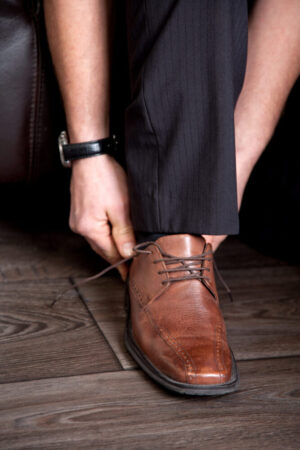 We all like to look our best, and the clothes we wear oftentimes plays a big role in how we look. A stylish outfit can bring out our best, but rarely are stylish options the most comfortable and supportive. That’s especially true for footwear, which oftentimes involves high heels, narrow toe boxes and limited arch support, all of which can take a significant toll on our feet. In today’s blog, we take a closer look at some of the problems that dress shoes can cause for your feet.
We all like to look our best, and the clothes we wear oftentimes plays a big role in how we look. A stylish outfit can bring out our best, but rarely are stylish options the most comfortable and supportive. That’s especially true for footwear, which oftentimes involves high heels, narrow toe boxes and limited arch support, all of which can take a significant toll on our feet. In today’s blog, we take a closer look at some of the problems that dress shoes can cause for your feet.
Dress Shoes And Foot Problems
Below, we examine the composition of some types of dress shoes and explain why these styles can be so hard on your feet.
High Heels – We’ve talked about lifted-heeled shoes on the blog in the past, so check out some of those previous articles for a more in-depth look, but high heels can cause a number of different issues for your feet and ankles. Lifted heels can put additional strain on your Achilles tendon, put excessive pressure on the ball of your foot, limit the natural motion of your ankle joint and are hard on your foot arch. Plantar fasciitis, arthritis and fat pad break down are all more common in people who wear high heels often.
Narrow Toe Boxes – Heels oftentimes have a narrow toe box, which can push the toes together and put you at much larger risk for a bunion, but men’s dress shoes can also cause these issues. Men’s formal footwear may feature Oxford-style shoes, which are known for the narrowing front of the shoe. As your toes are forced inward, the joints can shift out of place, and they won’t just shift back once pressure is removed. You’re on your way to a bunion.
Limited Arch Support – Again, because dress shoes focus on style over comfort, most of them are sorely lacking in arch support. Even if you don’t have high arches, you may notice arch pain if you’re in dress shoes regularly. Problems like fallen arches, loosening of supportive soft tissues and plantar fasciitis are all common complaints from people whose footwear fails to provide ample arch support.
Tight Heel – Dress shoes tend to be much more rigid than a sneaker, and if you’re trying to fit your foot into a tight shoe, odds are there will be pressure placed on your heel from the back of the shoe. Tight heels, especially in elevated options, put increased pressure on the heel bone and the Achilles tendon, which can lead to faster degeneration.
We understand that some occasions call for shoes that are more fashionable than comfortable, but it’s still important to be smart about your dress shoes. Limit your time in them if possible, avoid high heels or go with a shoe with a lower heel, look for rounded toe boxes instead of narrow toe boxes and consider an orthopedic insert to help cushion the bottom of your foot and provide some much needed arch support!